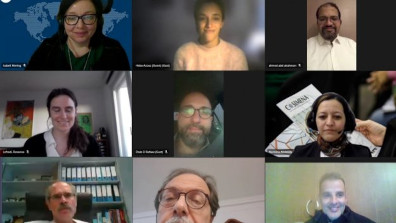Current Trends in Neurosurgery: Innovative Approaches and the Role of Artificial Intelligence
Digitalisation is becoming integral to research strategies, and the role of Information and Communication Technology (ICT) and Artificial Intelligence (AI) is increasingly in the spotlight of the scientific community, including the medical fields. To address this, the DAAD Regional Office Cairo conducted an interdisciplinary expert session on January, 21st, 2022, with researchers and scientists active in the corresponding fields across Germany and Egypt.
The event took place in the framework of the project “Clusters of Scientific Innovation in the Middle East and North Africa” (COSIMENA).
Ms. Isabell Mering, Director of the DAAD Regional Office Cairo, inaugurated the digital event by stating that: “AI has become increasingly essential to medicine practice. By facilitating a breakthrough in methodology, it might potentially revolutionise the medical field”.
In line with the “COSIMENA” mission, the session threw a light on the vivid network development between University of Greifswald (UG) in Germany and Cairo University (CU) in Egypt through the DAAD-funded “Cairo-Greifswald Fellowship” alongside the German University in Cairo (GUC) which contributes to this success by offering expertise in the ICT/AI fields.
One of the pillars of this liaison, who personifies a representative model of DAAD-supported network capabilities, is the DAAD alumnus Prof. Dr Ehab El Refaee, Coordinator of the “Cairo-Greifswald Cooperation Project” at CU. Along with his colleague Prof. Dr Ahmed Zohdi, Supervisor of the project at CU, they revisited how the cooperation came to life and highly valued the DAAD as a supportive partner. Prof. Dr Henry W. S. Schroeder, Supervisor of the project at UG, further then reviewed the successful scientific output of the project. Aiming to expand this scientific community to the whole MENA region, the expert session knitted a sequel to this existing partnership by increasing the visibility of the project on an international level. In providing “A Prescription for a successful Medical German-Egyptian Cooperation”, the speakers gave an overview of the status quo, achievements, challenges, and opportunities in the fields of teaching and research in Neurosurgery.
Although ICT/AI are without a doubt beneficial for the patient, as noted by Prof. Dr Schroeder, the experts unanimously agreed on the current irreplaceable human factor in neurosurgery. The call for an interdisciplinary approach posits, according to Prof. Dr El Refaee, the challenge of the future. In turn, the “COSIMENA” expert session reiterated the aim for interdisciplinarity by facilitating a digital nod for further scientific connection. The coordinator, further, noted how the pandemic posed a great challenge due to the importance of “in-person contact” and “hands-on learning”. Hence, he presented the “Blended Learning Experience in the Surgical Field: Challenges and Opportunities” and offered insights into how e-learning can foster interactive education rather than a passive learning experience.
The “Cairo-Greifswald Cooperation Project” consists of six modules: an online basic module, a live surgery session, an advanced digital interactive course, a virtual career development forum, a hands-on training module and a revision seminar with final exam. Dr Ahmed Abdelrahman, Lecturer of Neurosurgery at CU, presented “The First hands-on Course in the Time of Corona: The Challenges we faced”. Furthermore, with the project’s two years of experience in “Online Exams in Neurosurgical Training”, Mr. Marc Matthes, Administrative Staff of the fellowship at UG, noted the necessary building blocks for online evaluation: “a question bank, an exam builder, and result management”.
Following the overview of “The Digitalisation of Learning and Teaching in Neuroendoscopy”, Prof. Dr Slim Abdennadher, Computer Scientist and President of the German International University (GIU), introduced “The Application of AI in the Surgical Field.” Exemplary thereof is the ‘Human Computer Interaction Research Lab’ (HUMAN++), implementing the following pipeline: “Visualise/analyse, communicate, educate, monitor/evaluate, and innovate”.
Besides the HUMAN++ Lab, the Germany-based BrainLab offers another example of health informatics in practice. Researcher Dr Michael Schwerter presented the competencies of BrainLab regarding “VR and AI in Neurosurgical Planning and Education”. He addressed the benefits of software-based technology in relation to patient education, representation of anatomy, teaching practices, diagnostics, and treatment planning.

Group picture of the insightful online event. I. Mering, Dr. H. Azouz, Dr. M.Soliman f.l.t.r, Dr. R. Lofredi, Prof. Dr. E. El Refaee, N. Abdelaty, f.l.t.r., Prof. Dr H.Schroeder, Prof. Dr A. Zhodi, Prof. Dr. S. Abdennadher, f.l.t.r.© DAAD Cairo
Followingly, from CU, Dr Heba Azouz, Neurosurgeon, and Dr Mohamed Soliman, Lecturer in the department, took the participants on a historical journey in “The evolution in Neurosurgery” and “History, Current, and Future of Robotic Science Surgery”. Where participants questioned the plausibility of fully automated operations, Prof. Dr El Refaee, stated that “we are not at the point to shift a hundred percent to robotic surgery”.
The session also discussed immuno-therapeutical approaches in the presentation “New Trends in Brain Cancer Therapy” by Dr Sascha Marx, DFG-fellow at the Dana-Farber Cancer Institute, Harvard Medical School. Followingly, Ms. Reem Elwy, active member of the Hydrocephalus Research Group at CU, positioned the role of “Systematic Reviews in Neurosurgery” for evidence-based medicine as one of the “pillars to come to a clinical decision”.
Concluding the event with “Further Research Projects in Neurology and Medical ICT in Germany”, Dr Roxanne Lofredi, Neurology Resident at Charité-Universitätsmedizin Berlin, presented the effects of continues Deep Brain Stimulation (DBS) treatment in case of Parkinson’s disease and Dystonia. She, furthermore, noted that the on-demand treatment by Adaptive DBS is currently under trial.
The event harnessed the synergies in the related fields, whereby innovative and interventional ICT/AI approaches in the medical field augment the quality of human health care. Especially for neurosurgery, which is a rapidly developing specialty in the surgical field, the event visualised the vibrant liaison networks on an international level. In the perspective of Prof. Dr Refaee is “the aim of the Cairo-Greifswald project to integrate ICT/AI in the medical field is in direct correlation with what the DAAD stands for; integrating cultures, disciplines, and scientists”. By spreading the call to expand scientific connection, the event successfully reflected the “COSIMENA” mission to intensify interdisciplinary networking opportunities across Germany and the MENA region.

















